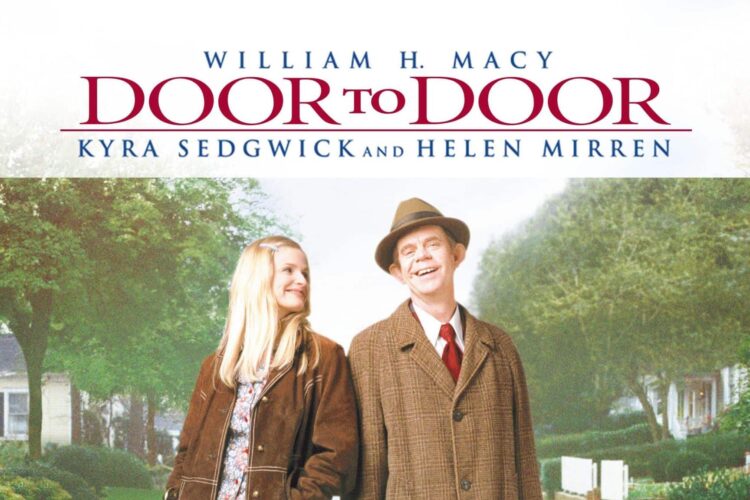I am ever more impressed with cable TV and its willingness to take on projects that would never see the big screen, despite their merit. Small projects about amazing, though not famous, people. I’m not talking about the Movie of the Week depiction of the latest scandal to hit the headlines, but rather the tales of those who would otherwise be unrecognized by the world at large. These projects also attract increasingly talented casts and exhibit increasingly high quality writing and production design. TNT produced exactly this type of film in the 2002 original production Door to Door.
Door to Door takes us into the life of Bill Porter (William H. Macy), a door to door salesman for the Watkins Company. His tale begins in 1955, as he pursues and achieves his goal of becoming a door to door salesman. This is no easy task for Bill, as he has cerebral palsy, affecting his gait, strength and speech. His potential boss feels that a sales position is not appropriate for Bill, the job too demanding and physically stressful for a man with relatively major physical limitations. Yet Bill is dogged in his determination to get this job – his mother (Helen Mirren) tells him he can do anything, and he persists with the knowledge that he can do the job, and that he has no intention of letting his mother down. After accepting the least desirable territory available, Bill sets out to prove he can do the job. We see his physical struggles that first day, and are introduced to the people that will come to represent his world – the people on his route.
Bill faces more than one struggle in his adult life, as he finds himself needing to care for his ailing mother. Yet the one constant in his life is his job, which he pursues with gusto – living the life of a born salesman. As times change, so do Bill, his customers and his circumstances. He is forced through physical limitations to hire someone to help him with deliveries, introducing Shelly (Kyra Sedgewick) into his life. The story fills out with the passage of time, the changes in the world of sales and in the life of Bill Porter and the people for whom he becomes a constant, reliable presence.
William H. Macy co-wrote the screenplay for Door to Door with director Steven Schacter. His performance as Bill is amazing. It’s a tricky thing to portray a person with significant physical disabilities without making them seem either maudlin or cartoonish. The make-up involved to make Macy resemble Porter as well as the awkward gait and the major speech difficulties with which Porter deals make the situation ripe for being overplayed. Macy never wavers in his depiction of Bill, his speech and movement is dead on throughout the entire film. As the film progresses and Bill ages, Macy achieves the ever more slumped posture of a man dealing with an ever more unreliable body with absolutely believable accuracy. Kudos to the make up team that transforms Macy over the course of the film – though he doesn’t look quite as young as he should at the beginning of the film, they age him marvelously.
The characterizations of all the major, as well as the plethora of peripheral, players is very nicely done. Bill is never made into an object of pity, the character is always treated with respect, regardless of whether that pulls at the heartstrings or not. Bill isn’t always the jolly yet downtrodden disabled man succeeding in a world that wants to hold him back. He has supportive friends and family, can be cranky and cantankerous and is remarkably stubborn. He comes across as the very real man that he actually is, rather than some stereotype of the disabled succeeding against all odds. The film has no need to throw unmoving obstacles in his way, or to introduce cruel and unfeeling characters to make Bill seem more upstanding. They let the story of the man be as it is – no exaggerated villains or contrived situations in the name of poetic license. Macy and Schacter set out to tell the story of a man, and this they have done, without embellishment. The result is a tale made more powerful for its ring of truth and lack of telltale exaggerations in the name of dramatic tension.
The peripheral cast is quite good. Helen Mirren as Bill’s mother is loving and determined. As her health fails and roles reverse, she is convincing in her confusion and anger. As with Macy, her age doesn’t seem to mesh with the age of the character particularly well at the beginning of the film, but they age her well, also. Kyra Sedgewick is something of a weak link in the cast. She isn’t actively awful, but she is so clearly acting – something the rest of the cast deftly sidesteps. Her dialogue delivery is stilted, her actions feel exaggerated, and her emotions seem overdone. I don’t know if she just isn’t a particularly good actress or if this simply isn’t one of her best performances, but she is outshone by virtually every other member of the cast.
Then there are Bill’s customers. Ranging from the squabbling neighbors to the overwrought housewife (a nice cameo appearance by Macy’s wife, Felicity Huffman) to the gay couple to the alcoholic and lonely apartment dweller, this is as eclectic a group as you’re likely to find. Joel Brooks as a gay florist turns in an excellent, albeit brief, appearance. It is through this character and his partner that the film takes a moment to recognize societal changes as they relate to Bill and his life. When a young friend of Alan is sick with Kaposi’s sarcoma in 1980, the implication is obvious, but the reference is quick, leaving the film to focus on Bill while the world changes inexorably around him. Kathy Baker plays the role of Gladys, the alcoholic customer who gives Bill his first sale. She, too, is a constant in his life for many years, though he doesn’t learn much about her during his frequent visits. Baker does a nice job with the role, not overdoing the character or making her into a caricature. We genuinely feel for this woman and for Bill as he learns more about her later.
The production design for Door to Door deserves special mention. Brent Thomas manages to create a believable palette on which to play out Bill’s life as time marches forward. The houses, cars, and general street chatter reflect each individual time period very, very well. Though the film is broken into segments indicating time period, we don’t rely completely on that obvious device; each era is reflected well in the exteriors, as well as in the clothing of the characters. Costume designer Betty Pecha Madden also deserves credit for helping make these transitions believable without being exaggerated. Late in the film, some of the exteriors are a little ham fisted (Shelly’s mansion-like suburban house being the best example), but overall the atmosphere is created and sustained well throughout the film. The score is unobtrusive, not relying on “songs of the times”, but rather reflecting the story at hand.
Overall, Door to Door is an excellent example of the made for TV drama. Moving away from the tawdry “snatched from the headlines” offerings we so often see on the major networks, cable has again proved to be an outlet for smaller, more personal stories. The story of Bill Porter is really nothing but a chronicle of one man struggling to get by in a thankless job that he unreasonably adores as time passes around him. But he is an engaging man, and his life is an interesting slice of Americana. Macy is a standout in the lead role and the production values are top notch for the genre. Worth a rent for fans of Macy, others might want to try and catch it on streaming.

Sue reads a lot, writes a lot, edits a lot, and loves a good craft. She was deemed “too picky” to proofread her children’s school papers and wears this as a badge of honor. She is also proud of her aggressively average knitting skills She is the Editorial Director at Silver Beacon Marketing and an aspiring Crazy Cat Lady.





Leave a Reply